Orangutans – victims of “sustainable” palm oil
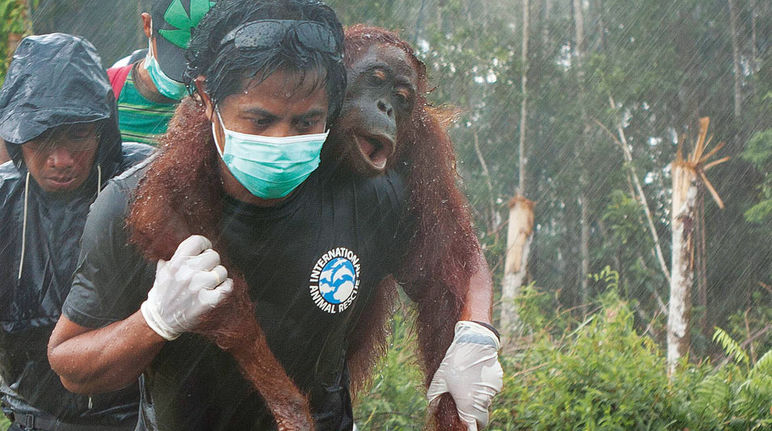 Rescue of an orangutan by IAR activists (© International Animal Rescue Indonesia)
Rescue of an orangutan by IAR activists (© International Animal Rescue Indonesia)
BGA claims that the issues we raise have been resolved. Reports by our partners in Borneo give us reason to doubt this, and we will continue monitoring the situation.
The wholesale destruction of rainforests on Borneo for the palm oil plantations of Bumitama Gunajaya Agro (BGA) is threatening the survival of orangutans. BGA is a member of the RSPO – the organization issuing the label for supposedly "sustainable" palm oil. Please call for a stop to deforestation and an end to palm oil imports NOW!
News and updates Call to actionTo: the respective governments and industry
“Stop deforestation and palm oil imports now. "Sustainability" seals are not effective at preventing the destruction of rainforests and loss of biodiversity.”
Flattened rainforests, orphaned proboscis monkeys, emaciated orangutans – the Indonesian palm oil company BGA is leaving a trail of destruction in its wake. In West Kalimantan province, the company is clearing irreplaceable primary forest – the habitat of protected orangutans and proboscis monkeys – in violation of the standards of the Roundtable for Sustainable Palm Oil (RSPO).
In April 2013, the NGOs Friends of Borneo and International Animal Rescue Indonesia filed an official complaint with the RSPO. We launched a petition at the time in support of their complaint.
In mid-November 2015, we received a letter from BGA requesting that we take down the petition. The problems of rainforest destruction that we criticized had allegedly been resolved and the company was now in compliance with RSPO standards. BGA assured us that it would "try" to do things right in future. The reports from our partners in Borneo paint a rather different picture.
Despite the promise to “do things right”, BGA continues to violate RSPO rules: on September 26, 2015, the NGO Link-AR Borneo and the community of Keklipor lodged a further complaint against unlawful activities by BGA on their land in West Kalimantan.
These and other cases are ample evidence that the RSPO seal is mere greenwashing. It does not prevent deforestation, loss of biodiversity, or even brutal land grabs against indigenous communities.
Please call for a stop to the destruction of Borneo's rainforests and the unbridled expansion of oil palm plantations.
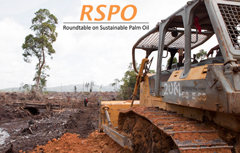
Despite its ruthless practices, palm oil producer BGA has been a member of the Roundtable for Sustainable Palm Oil (RSPO) since 2007. BGA’s customers include IOI, Wilmar and Sinar Mas, companies that sell the palm oil to European food and consumer goods manufacturers and biodiesel producers.
Additional information and images
BackgroundOrangutans and biodiversity
The habitat of orangutans and the immense biodiversity of tropical rainforests are being irreparably destroyed for ever-larger palm oil plantations. The animals are not welcome on the plantation clearings, and would not be able to survive there. When summoned, the staff of International Animal Rescue Indonesia (IAR) therefore has no choice but to tranquilize the orangutans, capture them, and take them elsewhere.
Video report of the orangutan rescue by International Animal Rescue
Yet hardly any replacement habitats remain for the animals. Beyond the cleared rainforest, endless oil palm monocultures extend to the horizon. Throughout Indonesia and in neighboring Malaysia, rainforests are being cut down for ever more oil palm plantations.
RSPO – "sustainable" palm oil
The Roundtable on Sustainable Palm Oil (RSPO) is an association on nearly 1,200 businesses – plantation companies, palm oil mills and traders, as well as their customers, including European food and consumer products companies such as Nestlé, Unilever and Henkel. A further dozen organizations with close ties to the industry, such as the WWF, serve as a fig leaf for the certification.
The RSPO does not rule out the destruction of rainforest land for new oil palm plantations. Only “high conservation value areas” (HCVAs) may not be cleared.
Rainforest Rescue is calling for the protection of all rainforest areas. The rainforests of Southeast Asia are home not only to orangutans, but to other endangered species such as proboscis monkeys and other primates, big cats such as tigers and clouded leopards, pygmy elephants, Sumatran rhinos, and many more. Many indigenous peoples and small farmers also rely on rainforests for their homes and livelihoods.
BGA: Bumitama Gunajaya Agro
The Bumitama Gunajaya Agro (BGA) palm oil company is part of the notorious Indonesian Harita Group, a conglomerate with mining (nickel, bauxite, coal), palm oil, tropical timber and cargo shipping interests. The Malaysian palm oil giant IOI, which also operates a major palm oil refinery in Rotterdam (Loders Croklaan) for the European market, holds a one-third stake in BGA.
To date, BGA has established 124,000 hectares of oil palm plantations at the expense of Indonesian rainforests in Borneo (West and Central Kalimantan) and Sumatra (Riau). The company has secured a further 65,000 hectares of land and is currently clearing around 13,000 hectares a year in order to cultivate oil palms.
Pictures
(Source: International Animal Rescue Indonesia IAR)
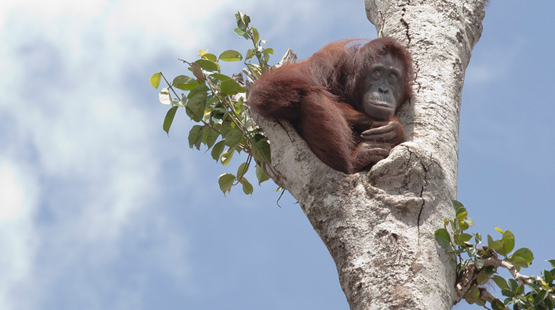
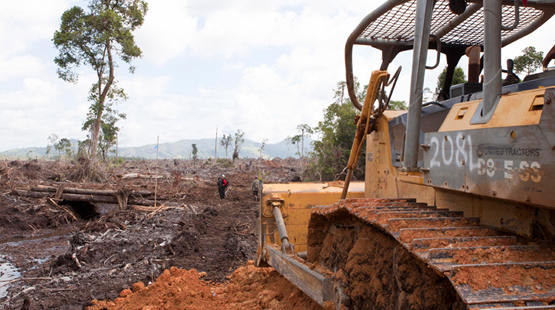
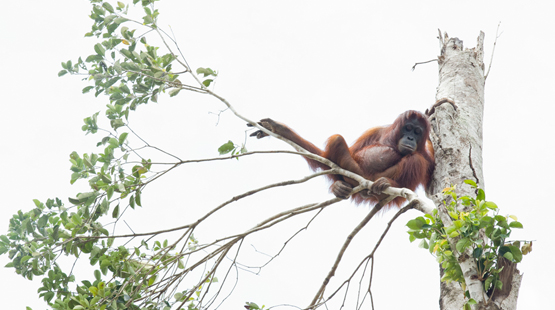
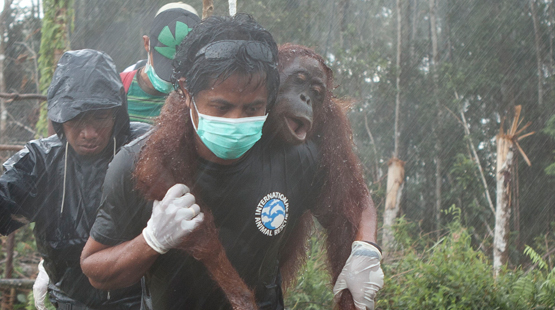
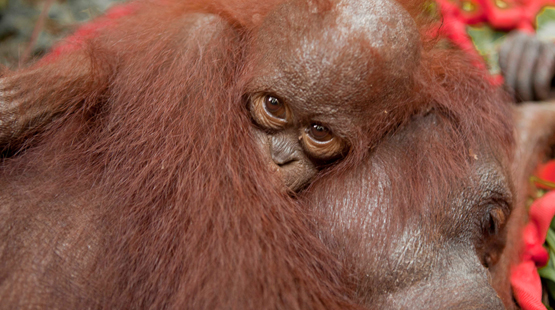
These photos were taken in March 2013 during IAR’s rescue of four orangutans on the BGA palm oil plantation concession in West Kalimantan.
To: the respective governments and industry
Ladies and Gentlemen,
“Sustainability seals” such as certification by the Roundtable on Sustainable Palm Oil (RSPO) cannot stop the clearance of rainforest land and destruction of biodiversity.
Most recently, Bumitama Gunajaya Agro (BGA), an Indonesian palm oil company, cut down vast tracts of rainforest in Borneo. The destruction of the ecosystem also means the demise of endangered animals such as orangutans.
In March 2013, four half-starved orangutans were rescued by International Animal Rescue Indonesia activists from a new clearing for oil palm plantations – as documented by the organization’s shocking photos and videos.
BGA is a member of the RSPO. BGA’s customers include IOI, Wilmar and Sinar Mas, companies that sell the palm oil to European food and consumer goods manufacturers and biodiesel producers.
The EU has recognized the RSPO as a certification system for sustainably produced biofuels, permitting RSPO palm oil to be used as an additive to diesel fuel.
Please put an end to rainforest deforestation and palm oil imports. In light of its environmental impact, palm oil has no place in our food, cosmetics or cleaning products, nor in the tanks of our vehicles.
Sincerely,
The issue – rainforest on our dinner tables and in our fuel tanks
At 66 million tons annually, palm oil is the most commonly produced vegetable oil. Its low world market price and properties that lend themselves to processed foods have led the food industry to use it in half of all supermarket products. Palm oil can be found in frozen pizzas, biscuits and margarine, as well as body creams, soaps, makeup, candles and detergents.
Few people realize that almost half of the palm oil imported into the EU is used as biofuel. Since 2009, the mandatory blending of biofuels into motor vehicle fuels has been a major cause of deforestation.
Oil palm plantations currently cover more than 27 million hectares of the Earth’s surface. Forests and human settlements have been destroyed and replaced by “green deserts” containing virtually no biodiversity on an area the size of New Zealand.
The impact – suffering and death in producer countries, climate havoc
The warm, humid climate of the tropics offers perfect growth conditions for oil palms. Day after day, huge tracts of rainforest in Southeast Asia, Latin America and Africa are being bulldozed or torched to make room for more plantations, releasing vast amounts of carbon into the atmosphere. As a consequence, Indonesia – the world’s largest producer of palm oil – temporarily surpassed the United States in terms of greenhouse gas emissions in 2015. With their CO2 and methane emissions, palm oil-based biofuels actually have three times the climate impact of traditional fossil fuels.
Palm oil is not only bad for the climate: As their forest habitat is cleared, endangered species such as the orangutan, Borneo elephant and Sumatran tiger are being pushed closer to extinction. Smallholders and indigenous people who have inhabited and protected the forest for generations are often brutally driven from their land. In Indonesia, more than 700 land conflicts are related to the palm oil industry. Human rights violations are everyday occurrences, even on supposedly “sustainable” and “organic” plantations.
As consumers, we are largely unaware of these broader issues, yet our daily palm oil consumption also impacts our health: refined palm oil contains large amounts of harmful fatty acid esters that are known to damage DNA and cause cancer.
The solution – a revolution on our dinner tables and in our fuel tanks
Only 70,000 orangutans still roam the forests of Southeast Asia, yet the EU’s biofuels policy is pushing them to the brink of extinction. Every new plantation on Borneo is destroying a further piece of their habitat. Stepping up the pressure on policymakers is a must if we want to save our tree-dwelling kin. Apart from that, however, there is still a lot we can do in day-to-day life.
Follow these simple tips to recognize, avoid and combat palm oil:
- Enjoy a home-cooked meal: Use your imagination: why not try almond-coconut-pear biscuits? Or pizza with potato and rosemary? A meal cooked from fresh ingredients beats processed foods containing palm oil every time. Oils such as sunflower, olive, rapeseed or flaxseed are ideal for cooking and baking.
- Read labels: As of December 2014, labeling regulations in the EU require food products to clearly indicate that they contain palm oil. However, in the case of non-food items such as cosmetics and cleaning products, a wide range of chemical names may still be used to hide the use of palm oil. A quick check of your favorite search engine will turn up palm oil-free alternatives, however.
- Remember that the customer is king: Ask your retailers for palm oil-free products. Write product manufacturers and ask them why they aren’t using domestic oils. Companies can be quite sensitive to issues that give their products a bad name, so inquiring with sales staff and contacting manufacturers can make a real difference. Public pressure and increased awareness of the problem have already prompted some producers to stop using palm oil.
- Sign petitions and write your elected representatives: Online campaigns put pressure on policymakers responsible for biofuels and palm oil imports. Have you already signed all of Rainforest Rescue’s petitions?
- Speak out: Protest marches and creative action on the street raise public and media awareness of the issue, which in turn steps up the pressure on policymakers.
- Leave your car at home: Whenever you can, walk, ride a bicycle or use public transport.
- Be informed and inform others: Big Business and governments would like us to believe that biofuels are good for the climate and that oil palm plantations are sustainable. Spread the word – share this information with your family and friends and encourage them to rethink their consumption habits. It’s in our hands!











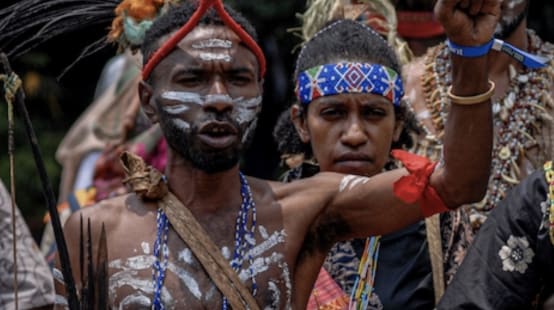
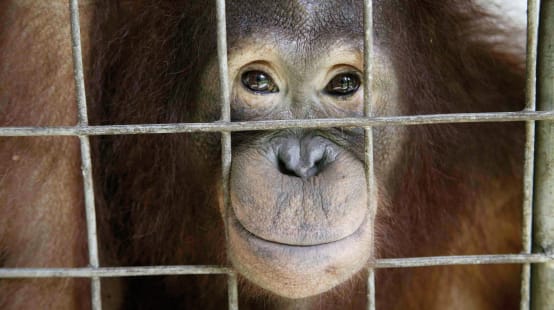
 Recent successes
Recent successes